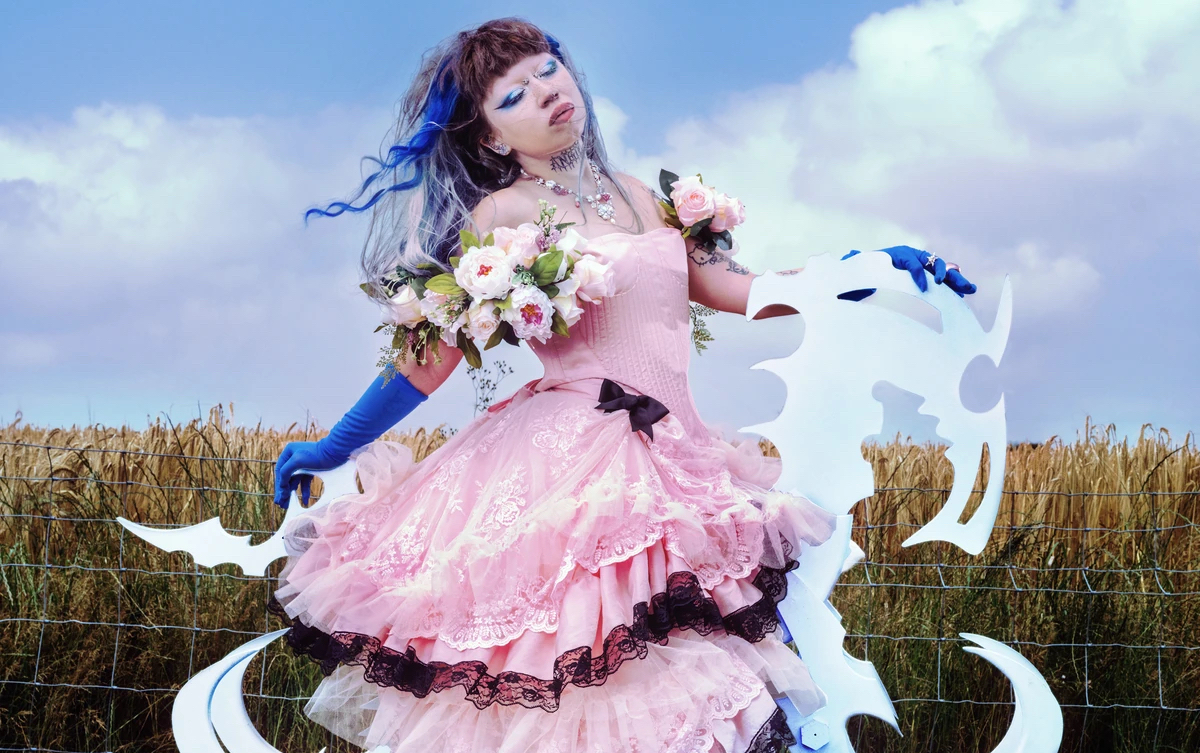Jazmin Bean’s 'Traumatic Livelihood' Is a Genre-Blending Exploration of Trauma and Healing

Are we more than our past? Can healing exist without grief? Does spite cancel out grace? Pop visionary Jazmin Bean has released their debut album, Traumatic Livelihood, and it is a kaleidoscopic exploration of all of these things at once—a true act of genre-blending, fantastical musical prowess in the face of trauma.
Listeners already know the sucker-punch singles, “Piggie” with its early 2000s emo-pop essence and “Terrified” contrasting it with romantic touches of Avril Lavigne. And, of course, the show-stopping “You Know What You’ve Done,” which sets us up for the range of spite, sadness, confusion, and euphoric determination that Bean weaves throughout the rest of Traumatic Livelihood.
One of the spectacles that we hear on the full album is the orchestral through-line that lives at the heart of the arrangements, elevating it from a standard pop record to something even more artful. “Favourite Toy” exemplifies this symphonic palette, using synth strings to carve out a lead melody in the place of a guitar. Layers of arpeggiating strings intertwine around each other, building up an instrumental foundation that tangibly aches with feeling. It makes a bed of desperation for the lyrics to lay on, which feigns nonchalance as Bean sings, “I feel nothing / Throw me in the backseat / Use me how you need / So long as I’m your favorite toy.” Though they claim to feel nothing, Bean’s musicality reveals a longing that emanates from the song in waves.
“Shit Show” is another colorful use of orchestral sounds, with its melodramatic, winding chorus melody. This song also captures the delicious genre clash of Traumatic Livelihood, as Bean pairs these soaring strings with dry, dirty drums and a distorted guitar. The titular album opener “Traumatic Livelihood” depicts this, starting us off with a picked guitar line born of a '90s-rock-ballad sound, oscillating and roaming. Then, vocal layers and strings creep in, shrouding the soundscape in gauzy theatrics. The song comes to a peak with a spiteful movement of pop-punk drums, crunchy guitar chords, and whining vocals. In just the first song, Bean takes us from a ballad to a rock anthem, tying it all together with a cinematic bow.
“Fish” leans heavily into pop, drawing on bubbly synths and strings to punctuate an introspective narrative about feeling stuck in self-destructive habits. But, once again, no song is ever one-note, and Bean dirties up the pop lightness with gritty live drums, invoking the prismatic spectrum of their influences. “Charm Bracelet” experiments, too, with a touch of hyper-pop, as well as delivering listeners the best first lines of the album, “Fuck angel numbers / I don’t believe love’s prepared.”
I had the chance to chat with Bean on our tastemaking podcast, Chef’s Choice, to get the inside scoop on the album-making process, and one of the tracks they were most excited for fans to hear was “Bitch With The Gun.” Now, after hearing the entire work, I can see where this song left a special mark. It’s a melodramatic embrace of the peaks and valleys of Traumatic Livelihood’s dynamics, acting as a sonic bridge between their previous works and this new one. Additionally, “Bitch With A Gun” is the track that takes back a lot of pride, spitting in the face of the heartache, opposition, and personal turmoil that Traumatic Livelihood explores. It lands near the end of the album, leaving listeners with a lingering triumph, as Bean sings, “Don’t doubt me, don’t you dare / I will not kneel… I adore a rude awakening, love a tough deal / I’m the bitch with the gun.”
The album closer, “Blood Brings Color and Fluoresce,” ends on a morbidly hopeful note, fitting to conclude this musical odyssey. Bean commented on the track, saying the song is for “the people with a little bit of blood in their garden… it adds character.” Ultimately, that’s a fitting summation of the album, too. Sonically and emotionally, there’s a bit of blood in the garden of Traumatic Livelihood. Beneath each pop sensibility lies an edge of grunge, and above each relationship, loved one, or version of themselves that Bean mourns within these songs is a blossom of hope. Boundaryless and exquisitely donned in theatrics, Jazmin Bean’s Traumatic Livelihood is a precious collection of the artist’s musical and personal voice.
Listen to Traumatic Livelihood below:

![panicbaby is Making Weird Girl Internet Music and her Debut EP “f u jonathan” is Living Proof [Q+A]](https://s3-us-west-2.amazonaws.com/onestowatch-v2/image0013.16.22_p_m-1770766454.jpg)
